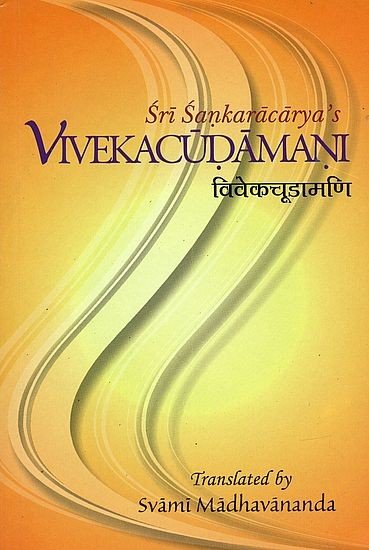Vivekachudamani
by Shankara | 1921 | 49,785 words | ISBN-13: 9788175051065
The Vivekachudamani is a collection of poetical couplets authored by Shankara around the eighth century. The philosophical school this compilation attempts to expose is called ‘Advaita Vedanta’, or non-dualism, one of the classical orthodox philosophies of Hinduism. The book teaches Viveka: discrimination between the real and the unreal. Shankara d...
Verse 220-222
देहं धियं चित्प्रतिबिम्बमेवं
विसृज्य बुद्धौ निहितं गुहायाम् ।
द्रष्टारमात्मानमखण्डबोधं
सर्वप्रकाशं सदसद्विलक्षणम् ॥ २२0 ॥नित्यं विभुं सर्वगतं सुसूक्ष्मं
अन्तर्बहिःशून्यमनन्यमात्मनः ।
विज्ञाय सम्यङ्निजरूपमेतत्
पुमान् विपाप्मा विरजो विमृत्युः ॥ २२१ ॥विशोक आनन्दघनो विपश्चित्
स्वयं कुतश्चिन्न बिभेति कश्चित् ।
नान्योऽस्ति पन्था भवबन्धमुक्तेः
विना स्वतत्त्वावगमं मुमुक्षोः ॥ २२२ ॥dehaṃ dhiyaṃ citpratibimbamevaṃ
visṛjya buddhau nihitaṃ guhāyām |
draṣṭāramātmānamakhaṇḍabodhaṃ
sarvaprakāśaṃ sadasadvilakṣaṇam || 220 ||nityaṃ vibhuṃ sarvagataṃ susūkṣmaṃ
antarbahiḥśūnyamananyamātmanaḥ |
vijñāya samyaṅnijarūpametat
pumān vipāpmā virajo vimṛtyuḥ || 221 ||viśoka ānandaghano vipaścit
svayaṃ kutaścinna bibheti kaścit |
nānyo'sti panthā bhavabandhamukteḥ
vinā svatattvāvagamaṃ mumukṣoḥ || 222 ||220-222. Similarly, discarding the body, the Buddhi and the reflection of the Chit in it, and realising the Witness, the Self, the Knowledge Absolute, the cause of the manifestation of everything, which is hidden in the recesses of the Buddhi, is distinct from the gross and subtle, eternal, omnipresent, all-pervading and extremely subtle, and which has neither interior nor exterior and is identical with one self – fully realising this true nature of oneself, one becomes free from sin, taint, death and grief, and becomes the embodiment of Bliss. Illumined himself, he is afraid of none. For a seeker after Liberation there is no other way to the breaking of the bonds of transmigration than the realisation of the truth of one’s own Self.
Notes:
[Hidden......Buddhi—It is the purified Buddhi which catches a glimpse of the Atman.
The sense of various Sruti passages of Advaitic import is reproduced in these Slokas. The reader
is specially ferred to the Brihadáranyaka III. viii. &, iva II. 2. and SvetasvaUua III. 8.]
